Academy Overview
Certified by the California Commission on Police Officer Standards and Training
The Los Medanos College Law Enforcement Academy is delivered in partnership with the Contra Costa County Office of the Sheriff Law Enforcement Training Center. The academy is paramilitary and highly disciplined. The recruits that are accepted into the academy are either hired by a law enforcement agency or selected as a “non-affiliated recruit” or student. A non-affiliated recruit is chosen by the academy staff based in their written test score, physical test score, results of a background investigation, and an oral interview.
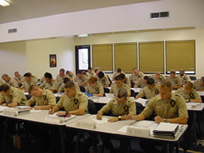
Once accepted into the Academy, recruits are expected to perform at the standards set by the academy staff. Recruits are given written exams on learning domains established by the California Commission on Police Officer Standards and Training (POST). The learning domains cover subjects ranging from California Laws to ethics and community relations. Any score below an 80% on these exams is considered a failing grade. The recruits are required to pass all of the written exams. Highly trained members of law enforcement from around the Bay area teach the material to the recruits. The instructors are experts in their field of instruction and offer on-the-job experience coupled with specialized training in that field. The instruction techniques range from lecture to roll playing, to hands-on.
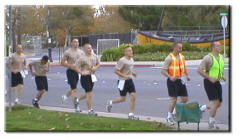 The academy recruits are required to participate in a rigorous physical fitness program
that pushes them to improve and then maintain their physical and mental fitness throughout
their law enforcement careers. A typical physical fitness session will consist of
a warm up, push-ups, crunches, field exercises, pull-ups, and a 2-5 mile run. The
academy has a “state of the art” fitness center that rivals most commercial fitness
centers. In order to graduate from the academy, the recruits are required to pass
a battery of physical tests such as; a dummy drag, obstacle course, 1.5 mile run,
and scale a 6ft wall.
The academy recruits are required to participate in a rigorous physical fitness program
that pushes them to improve and then maintain their physical and mental fitness throughout
their law enforcement careers. A typical physical fitness session will consist of
a warm up, push-ups, crunches, field exercises, pull-ups, and a 2-5 mile run. The
academy has a “state of the art” fitness center that rivals most commercial fitness
centers. In order to graduate from the academy, the recruits are required to pass
a battery of physical tests such as; a dummy drag, obstacle course, 1.5 mile run,
and scale a 6ft wall.
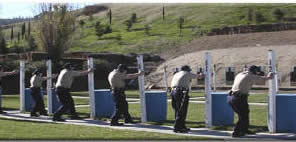
As well as mental and physical tests, the recruits will be expected to master the technical skills of firearms operation, defensive tactics, and emergency vehicle operation (EVOC). An experienced staff of firearms instructors educates the recruits on manipulation, safety practices, and the firing of handguns and shotguns. The recruits endure approximately 120 hours of hands on firearms training and are ultimately required to pass numerous handgun and shotgun courses. A team of defensive tactics instructors train the recruits in the art of control holds, handcuffing techniques, gun take away and retention and baton strikes. The instruction is physically demanding and requires the recruits to master each technique and physically demonstrate it during a test. At the Basic Academy’s driving course, the recruits will learn the safe operation of an emergency vehicle. They will be tested on a timed driving course and required to perform a “pursuit” scenario.
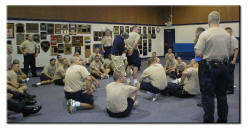
At the end of the course, provided the recruit has met all of the standards and passed all of the required tests, the recruit will graduate from the Basic Academy with a certificate of completion. The certificate is certified by POST and states that the recruit has successfully completed the training mandated and performance objectives required by the California Commission. Through the partnership of the Contra Costa Office of the Sheriff and Los Medanos College, each recruit will also earn 25 semester units of college credit. Once a recruit has graduated from the Basic Academy, he or she is eligible for employment as a peace officer in most California jurisdictions.
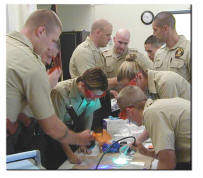 The Basic Academy at the Contra Costa County Law Enforcement Training Center prides
itself on being one of the finest academies in the state. By employing the finest
instructors, utilizing state of the art facilities and an absolute commitment to the
success of the recruits; Los Medanos College and the Contra Costa County Law Enforcement
Training Center graduate law enforcement professionals that are second to none!
The Basic Academy at the Contra Costa County Law Enforcement Training Center prides
itself on being one of the finest academies in the state. By employing the finest
instructors, utilizing state of the art facilities and an absolute commitment to the
success of the recruits; Los Medanos College and the Contra Costa County Law Enforcement
Training Center graduate law enforcement professionals that are second to none!
Cost: The cost of the Basic Academy is approximately $4,385.00**, which includes student registration fees and all associated training and material fees, including the Emergency Vehicle Operations Course.***
Scholarships/Financial Aid - Bay Alarm Company may provide LETC Non-Affiliated Recruits (those not currently employed by an Agency) with scholarship funds, offsetting the cost of the Basic Academy. For more information regarding scholarships, please call the Academy Clerk at 925-427-8238.
Military Veterans: The Law Enforcement Academy is approved by the Department of Veterans Affairs for VA benefit under the G.I. Bill. Additional information may be obtained from the Los Medanos College Office of Admissions & Records by calling 473-7500 or from the Veterans Administration Regional Office, San Francisco, 1-800-827-1000.
Registration: To apply for the Basic Academy, students must complete and pass the P.O.S.T. certified
reading and writing comprehension test. Contact Napa Valley Criminal Justice Center:
http://www.nvccjtc.org/register-for-a-course/basic-police-academy-entrance-exam/. Scores from outside agencies other than Napa Valley are accepted if it is within
1 year.
Location: The Basic Academy meets at the Contra Costa County, Office of the Sheriff, Law Enforcement
Training Center at 340 Marina Boulevard, Pittsburg, CA. Firearms, field tactics, and
driver training are held at off-campus sites. Schedules and locations are subject
to change.
**additional $500 (approx.) for uniforms
***EVOC fee may be reimbursed by P.O.S.T. for affiliated students
Any request for accommodations in a training program or for off-campus training should be referred to a DSPS counselor. Students should keep in mind that the individual institutions that host the College’s training programs may have their own rules and regulations that must be followed, and not all accommodations requested may be feasible, permissible, or reasonable. Therefore, DSPS will work together with the students, the instructor, and the on- or off-site training program to determine the appropriate accommodations and facilitate in implementing those accommodations.

